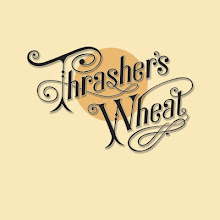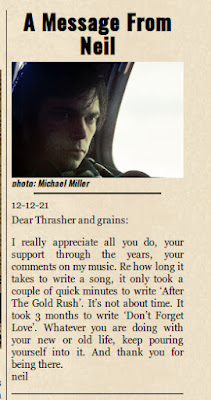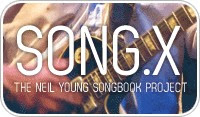A Fan's Reaction to Waging Heavy Peace by Neil Young - CBC Music
So what does one long time Neil Young fan think of his new book Waging Heavy Peace?
Well, the answer may surprise you.
From CBC Music - What’cha Readin’? Jason Schneider on Waging Heavy Peace by Neil Young, noted music writer/author, Jason Schneider discusses his passion for Young and his music. Schneider wrote about Young extensively in his book Whispering Pines: The Northern Roots of American Music . . . from Hank Snow to The Band
, and also in a biographical timeline on Neil Young.
At this point, we'll reserve judgement on Schneider's comments and let them speak for themself. But hey, don't let that stop anyone from commenting below on whether they liked Waging Heavy Peace.
Labels: neil young, waging heavy peace































 Human Highway
Human Highway

















 Concert Review of the Moment
Concert Review of the Moment





 This Land is My Land
This Land is My Land

 FREEDOM In A New Year
FREEDOM In A New Year









 *Thanks Neil!*
*Thanks Neil!*




![[EFC Blue Ribbon - Free Speech Online]](http://www.thrasherswheat.org/gifs/free-speech.gif)











 The Unbearable Lightness of Being Neil Young
The Unbearable Lightness of Being Neil Young Pardon My Heart
Pardon My Heart



 "We're The Ones
"We're The Ones  Thanks for Supporting Thrasher's Wheat!
Thanks for Supporting Thrasher's Wheat!




 This blog
This blog 
 (... he didn't kill himself either...)
#AaronDidntKillHimself
(... he didn't kill himself either...)
#AaronDidntKillHimself









































































 Neil Young's Moon Songs
Neil Young's Moon Songs




 Civic Duty Is Not Terrorism
Civic Duty Is Not Terrorism Orwell (and Grandpa) Was Right
Orwell (and Grandpa) Was Right


 What's So Funny About
What's So Funny About 



15 Comments:
No personal offense to this guy but there's nothing like a book critic who doesn't read the book.
He seems like a nice guy (maybe a frequent visitor here, perhaps?), but good God! - have a cup of coffee, eh? Low, low energy.
yeah Old Black.
Probably should've titled post as "non-reaction". In fact shouldn't have posted at all.
But it seemed to have a little value and kind of a cool video.
oh well. a little chaff gets thru every now and then.
Wow, what writer comments on a book without having read it? He would be pissed if someone reviewed his book and didn't read it. Have some respect for the artist and the craft that you make your living from.
Sure, Waging Heavy Peace isn't all gold and sure, it may not be exactly what we wanted from Neil but isn't that what we expect of Neil? To be unpredictable and try new things? It's what made him the artist that we love and respect. There are quite a number of passages in WHP that are amazing insights into the kind of stuff we all wanted to hear Neil talk about. Sometime you just need to sift through the garbage to get there. The passages on Will To Love as well as the final times he saw Danny Whitten, David Briggs, LA Johnson and Ben Keith are all amazing reads. And nothing is worse than a Neil Young 'fan' expecting him to put out stuff like he did in the 70's. If you want that, go talk to The Eagles.
I loved the book. I couldn't get over how personal it was and it really felt like he was just talking to me.
It was an extended e-mail conversation about where he currently is, where he used to be and where he wants to be.
The one word I kept thinking of was INTIMATE, as the pages rolled by too quickly.
I didn't want it to end, much like his music career and his life as a whole.
@Cinnamon Boy,
My thoughts exactly. Thank u.
Tuesday can't come fast enough!!
Everybody is entitled to have his own opinion,but don't judge a book by the cover or extracts!Read it and then give comment.I like the book.It's honest.It goes back and forth,so an "inaresting" read.I recommand it to every Neil-fan!Cees Mostert
WHP is fun read for us die-hard fans to be sure.
There are, however, a few incites into Neil's mindset that I really found quite interesting/disturbing.
In the religion Chapter, Neil writes that "I suppose evil is necessary to justify the existence of organized religion".
Wow.
That is a stunning & puzzling take on this world in which we all live. I really cannot believe that Neil wrote such a statement.
In fact, I find the statement so strange that I'm still trying to process what I think he meant days after reading it.
Say what you want about organized religion, there is real evil in this world.
Look around.
What did you mean, Neil?
I was very surprised reading this book. I did not read the "sneak preview" that was released prior to the actual release, but I did read the reactions. You would have thought Neil wrote a novel so terrible, so unspeakably horrible that the entire medium would either have to ignore it completely, or, acknowledge the work and then the written word would fizzle out into oblivion as we know it. Of course, after reading it this was not the case at all.
Neil can be very eloquent in the way he writes down his thoughts. I think of the scene with him watching the waves come in against the coral in Hawaii, explaining that this was his religion. (I was quite shocked about his views on religion for no other reason than that they so closely resemble mine. I meet people who are Christians, or Hindus, or what have you, and they tell me I must be an Atheist. Then I meet Atheists and I know I am not one at all because I believe in the spirit of things and I believe that we are all connected by some presence that we witness every waking day. I just don't belong to an organization that tells me how to believe in it. To read Neil's interpretation of this was so comforting to me, I think I read that passage over and over for a couple days, just so it would sink in.
Another section in the book that I re-read probably 10 times was when he speaks of calling Springsteen after Clarence died. How he equated the loss to that of Ben Keith. He didn't go into detail, and he didn't exploit Bruce's pain for his story. He just said how he felt, and that he called him and it was very touching. In the next paragraph he starts to describe Crazy Horse in a way that was so beautiful and meaningful that it shouldn't have shocked any of us that Psychedelic Pill is as strong as it is. There was real love in this reunion, in these recordings, and on this tour.
As a man who is so famously (infamously?) private, I was amazed that he allowed us to peer into these windows of his life, if only just for a moment, like that fleeting glimpse in Pink Floyd's "Comfortably Numb".
The conclusion of the book was executed perfectly. The reader can visualize Neil driving to the diner, listening to that music on his radio, not ever knowing where he's going until he arrives and sees his old friends. It was so poignant. This is not a read I will soon forget.
I'm going to listen to Walk Like A Giant now.
Cheers,
T.
Get me a bucket list ! All of this analysis is way over the top. The book is just Neil's ramblings much like PP. Don't look too deep you'll be disappointed.
This comment has been removed by the author.
Taylor, you too are very eloquent in how you write your thoughts. I loved Neil's book and felt fortunate that he let us peek in his windows ;-) His words are validating, comforting and insightful.
Peace & Love
L
Over and Over again...
As to Neil's short chapter on religion, I thought that was a big statement, too. What it seems to me that he is focusing on is the notion that, in organized religion, especially the Christianity so prominent in America today, there is a great deal of emphasis on sin and fighting evil--all of this negative, ugly stuff. People have done and will continue to do awful, harmful, hateful, terrible things and we might consider those acts and/or people to be "evil." I'm never completely sure whether it's the right word, though. My issue with word evil is that it doesn't just mean people doing bad things or even negative energy; it implies some greater metaphysical condition of our existence in which there is "good" and "evil." I also tend to associate the word with animalistic, primal, reactionary instinct. It's such a judgmental, loaded, and, in some ways, uncivilized concept, that I don't like throw the term around regarding my fellow people without extreme caution and consideration. And most of the time when we're using the word "evil" to describe a real action or person, we're in no state of mind careful deliberation, because the kinds of things that we classify in terms of "evil" tend, of course, to be very, very difficult to handle.
Barring even that consideration, as that's purely my own tangent, different religions can give us different conceptions of evil. The evil you hear preached about in church, I think, is not necessarily the same as the general sense of evil that many people see and believe in. So even if evil exists, it is a different matter as to whether any church, synagogue, or temple's idea of evil carries any truth or validity. Much of organized religion does thrive in part (and perhaps only in part) on the notion of evil and combating the enemy in one way or another, or at least organized religion often tends to be focused on discussing conceptions of evil, hell, the devil, damnation--bad things that bad people do, and the punishment for them. There really is a tremendous amount in some religions about fighting and, ironically, a lot of focus on evil in the name of avoiding evil. (Although one does have to know one's enemy, of course.) I don't blame Neil for not seeing the spirituality in fire and brimstone. What Neil did specifically say, is that he feels no evil *when* among the trees and the moon--that there is no evil from them. This doesn't really deny the existence of evil, and may even imply that it does exist *somewhere else.*
So perhaps Neil is suggesting that organized religion tends to exploit or take advantage of the concept of evil, training people's minds on that rather than on the peace, tranquility, and transcendence that he finds in the "forest church" ('For the Love of Man'). That of the existence of evil, however, is one of our greatest assumptions, so perhaps it isn't a bad idea to question it now and then. Or at least, to question the notions of evil that churches offer us.
About the video (having trouble loading before), in fairness to Schneider, it's not meant to be a book review per se. I don't think I was even aware of the preview excerpts at the time, but I agree with the other comments that you can't judge any book on that basis. So it seems unfair to pass opinion without having read the book. Nothing wrong with posting it, though. It's one fan's perspective on Neil in general--just an interesting morsel to chew on.
Easily understood with a mind of your own. Religion = fear
That is not what he meant. You are taking religion in all the wrong that it is. The idea of evil creates fear which makes us believe a bunch of bullshit in order to think we can be saved. There is no good and no evil. Only perception of what they are. We all have a different map of the same territory.
Post a Comment
<< Home